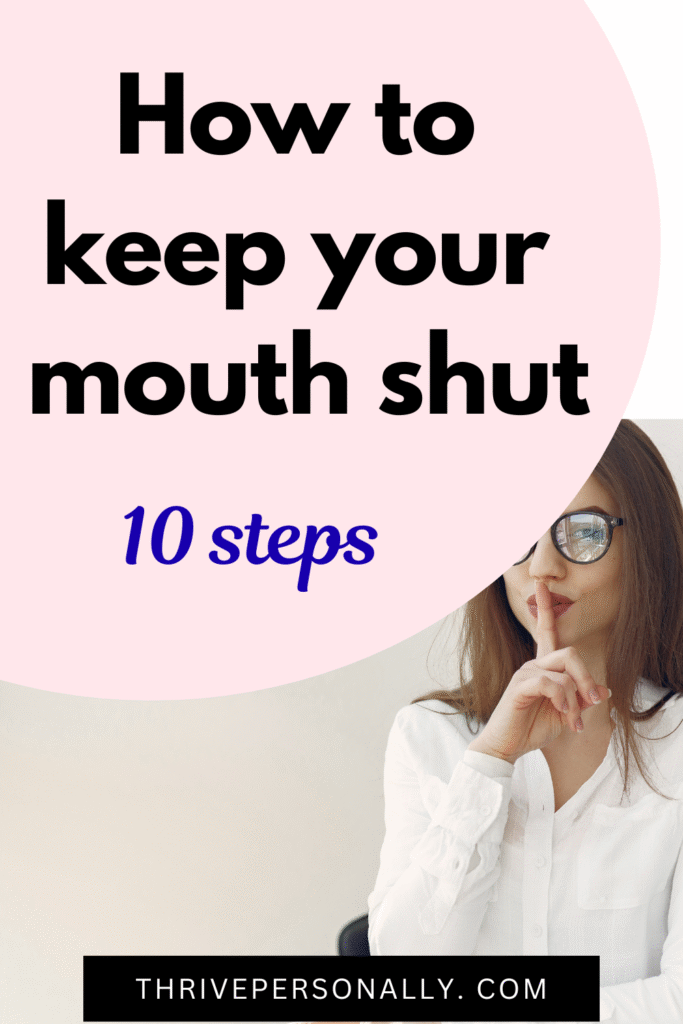I’ll be honest with you — keeping my mouth shut has been one of the hardest lessons I’ve had to learn in life. I used to think speaking my mind all the time was a sign of honesty and confidence. If I felt something, I said it. If I thought I was right, I made sure everyone knew. But over time, I noticed something: many of my words were not helping anyone, and sometimes they even hurt me.
There were moments when I walked away from conversations feeling uneasy. I’d replay my words in my head, realizing I had given away too much, said something I shouldn’t have, or created tension where it didn’t need to exist. The truth is, not every thought we have needs to be shared, and not every situation needs our opinion.
It took some painful experiences for me to understand that silence can be more powerful than words. Keeping my mouth shut doesn’t mean I’m weak. It doesn’t mean I don’t have ideas. It means I’ve learned to value my peace, protect my privacy, and give my thoughts the time they need before letting them out into the world.
10 Steps to Keep Your Mouth Shut
1. Respect the Power of Silence
Silence speaks volumes. Often, words reveal less than silence does. Staying quiet gives you space to think and lets others speak without interruption.
Research shows that silence and pauses in conversation can make interactions more thoughtful and respectful (Harvard Business Review). The people who are most respected and trusted are often those who talk less and listen more—this isn’t an accident, it’s a habit that builds influence.
Once you understand that silence can help you avoid unnecessary conflict, protect your privacy, and make you a better listener, it stops feeling like a weakness.
Read also: How to Silence Your Inner Critic
2. Know What Pushes Your Buttons
Before you can control what comes out of your mouth, you need to understand what makes you speak up too quickly. For me, it was feeling misunderstood, wanting to defend myself, or needing to prove I was right.
Think about the situations that trigger you to talk too much. Is it when someone criticizes you? When you’re nervous? When the room goes quiet and you feel pressure to fill the silence?
Once you know your triggers, you can catch yourself before speaking. This pause is your first line of defense.
3. Wait Before Responding
This became my strongest habit. I learned the value of waiting just a few seconds before answering—sometimes just three seconds is enough. It gives your brain time to process what was said and decide if your reply is even necessary.
You don’t have to make the pause obvious. You can nod, take a sip of water, or simply breathe. Many times, I’ve realized in that short space that my reply wasn’t worth saying.
Studies from the University of Missouri show that short breaks in conversation reduce misunderstandings and lower the chances of saying something you’ll regret.
Read also: Why I Stopped Meditating
4. Practice Active Listening
One reason we talk too much is because we’re not truly listening—we’re just waiting for our turn to speak. Active listening means focusing fully on the other person’s words, tone, and body language.
When you do this, you naturally talk less because your goal shifts from responding quickly to understanding deeply. Occasionally paraphrasing what they’ve said shows you’re paying attention and also gives you time to decide whether you need to reply at all.
5. Protect Your Privacy
You don’t have to share everything about your life, even with close friends. Too much information can lead to misunderstandings, judgment, or even be used against you later.
I used to think being completely open was a sign of authenticity. But I’ve learned that privacy is a form of self-respect. If what you’re about to share won’t help anyone—and could hurt you—it’s better left unsaid.
Read also: 7 Ways social media is Harming Your Mental Health
6. Get Comfortable with Silence
Many people talk too much simply because they’re uncomfortable with quiet moments. But in many cultures, silence is seen as a sign of respect and deep thought.
I began practicing this by letting moments of silence pass without rushing to fill them—sometimes with just a smile or a nod. The more you practice, the more natural it feels.
7. Don’t React to Every Provocation
Some people say things just to get a reaction—an insult, a bad joke, or a comment meant to make you angry. I used to respond every time, but I realized that not every remark deserves my energy.
When you choose not to react, you deny the other person the satisfaction of your attention. This isn’t about letting people “win”—it’s about choosing which battles are worth fighting.
8. Write It Down Instead
When you feel the urge to speak but know it’s not the right time, write your thoughts instead. Journaling releases the pressure without creating problems.
I’ve written many things in my journal that I’m grateful I never said out loud. Later, when I reread them, I often see that they didn’t need to be said at all.
9. Build Self-Control Through Small Wins
Self-control is like a muscle—the more you train it, the stronger it gets. Start with low-pressure situations. Let someone finish their story without interrupting, even if you have something to add.
You can also practice by ignoring small mistakes or comments you’d normally correct. Over time, these small acts make it easier to stay quiet in bigger moments.
10. Focus on the Long-Term Benefits
The real turning point for me was realizing the long-term benefits of keeping my mouth shut. I stopped engaging in pointless conversations, avoided sharing things that could be used against me, and gained more respect as someone thoughtful rather than reckless.
Psychologists have found that people who talk less are often seen as more intelligent and trustworthy (Psychology Today).
When you remember that silence protects your peace, strengthens your relationships, and improves your reputation, it becomes easier to choose it over unnecessary words.
Final Thoughts
Learning to keep your mouth shut isn’t about being cold or distant. It’s about being wise with your words. Silence, when chosen, is a sign of self-control, wisdom, and strength.
I still slip up sometimes. But every time I resist the urge to speak and let silence work for me, I feel calmer, more in control, and more at peace.
If you want to protect your peace, build stronger relationships, and make your words count, start practicing these 10 steps today. Over time, you’ll discover that silence isn’t just the absence of speech—it’s a powerful tool for living well.
Save the pin for later



